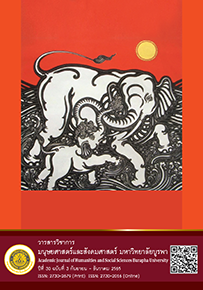An Application of Buddhadasa Bhikkhu’s Concept of the Mount of Buddha-Dhamma Way for Conflict Management in Online Communities
Main Article Content
Abstract
The main cause of conflicts within today’s online communities is that people express their opinions with false information intended to invade the privacy of others. This act, according to Theravada Buddhism, arises from personal bias rooted in a blind adherence to one’s own ideas.
Buddhadasa Bhikkhu introduced the concept called the Mountain of Buddha-Dhamma Way. It is a practical framework for reducing people’s attachment to ideas, by persuading them to reject what conceals natural truth, and to learn to accept nature as it is. By this concept, this paper suggests that it is potentially applicable to conflict management. Based on the Mountain of Buddha-Dhamma Way framework, the study proposes the RCF Model to solve conflicts found in online communities. That is to start with R, thought revolution, followed by C, changing action, and finally F, enacting new results.
Downloads
Article Details

This work is licensed under a Creative Commons Attribution-NonCommercial-NoDerivatives 4.0 International License.
บทความทุกบทความเป็นลิขสิทธิ์ของวารสารวิชาการมนุษยศาสตร์และสังคมศาสตร์ มหาวิทยาลัยบูรพาเท่านั้น
References
จำนง อดิวัฒนสิทธิ์. (2548). สังคมวิทยาตามแนวพุทธศาสตร์ (พิมพ์ครั้งที่ 2). มหาวิทยาลัยเกษตรศาสตร์.
ไทยรัฐออนไลน์. (2563). ศาลจำคุก 1 ปีนักเลงคีย์บอร์ดหมิ่นไทยรัฐใช้ข้อมูลเท็จแพร่โซเชียล. https://www.thairath.co.th/news/local/bangkok/1994859
บัตเลอร์และแม็กมานัส. (2557). จิตวิทยาความรู้ฉบับพกพา (ณัฐสุดา เต้พันธ์, แปล). โอเพ่นเวิลด์.
เปลโต้. (2534). ไครโตโสกราตีสในคุก (ส.ศิวลักษณ์, แปล). ปาจารยสาร.
พระไตรปิฎกออนไลน์ภาษาไทย. (2560ก). พระสุตตันตปิฎก ฉบับมหาจุฬาลงกรณ์ราชวิทยาลัย เล่ม 10 ข้อ 213-215 หน้า 212. https://84000.org/tipitaka/read/m_siri.php?B=18&siri=165
พระไตรปิฎกออนไลน์ภาษาไทย. (2560ข). พระสุตตันตปิฎก ฉบับมหาจุฬาลงกรณ์ราชวิทยาลัย เล่ม 16 ข้อ 213 หน้า 351. https://84000.org/tipitaka/read/m_siri.php?B=24&siri=188
พระธรรมโกศาจารย์ (ประยูร ธมฺมจิตฺโต). (2551). เปรียบเทียบแนวคิดพุทธทาสกับซาตร์. สุขภาพใจ.
พุทธทาสภิกขุ. (2508). แก่นพุทธศาสตร์. ธรรมสภา.
พุทธทาสภิกขุ. (2538). ชุมนุมข้อคิดอิสระ (พิมพ์ครั้งที่ 4). สุขภาพใจ.
พุทธทาสภิกขุ. (ม.ป.ป.). ภูเขาแห่งวิถีพุทธธรรม. http://www.namjaidham.net/forum/index.php?topic =940.0
วราพร ดำจับ. (2562). สื่อสังคมออนไลน์กับการเรียนรู้ในศตวรรษที่ 21. วารสารศิลปศาสตร์ มหาวิทยาลัยแม่โจ้, 7(2), 143-159.
สมภาร พรมทา และปรีชา ช้างขวัญยืน. (2549). มนุษย์กับการใช้เหตุผล. อรุณการพิมพ์.
สุธิดา ผิวขาว. (2563). การหมิ่นประมาททางสื่อสังคมออนไลน์. วารสารนัมฎองแหรกพุทธศาสตรปริทรรศน์, 7(1), 97-111.
Aristotle. (1999). Politics (Jowett, Trans). n.p.
Marx K., & Engels F. (2010). Manifesto of the communist party (Moore, Trans). n.p.
Spring Life. (2565). ตำรวจ ปอท. เปิดสถิติ CyberCrime ประจำปี 2564 พร้อมเผยแนวโน้มปีนี้. https://www.springnews.co.th/spring-life/819659
Susana, G. (2018). Percieved motivations of educators applying and volunteering in edtech ambassador programs within Mcclelland’s achievement motivation theory. [Doctoral dissertation of Education in Educational Leadership, Lamar University].
Tara, N. (2020). Self-reported feelings of shame and fear of failure among high ability undergraduates. [Doctoral dissertation of Philosophy, University of North Texas].
Tonnette, M. (2019). Consumer purchase motivation in digital environments: The effect of intrinsic motivation on banner advertisement effectiveness. [Doctoral dissertation of Business Administration, Jacksonville University].


